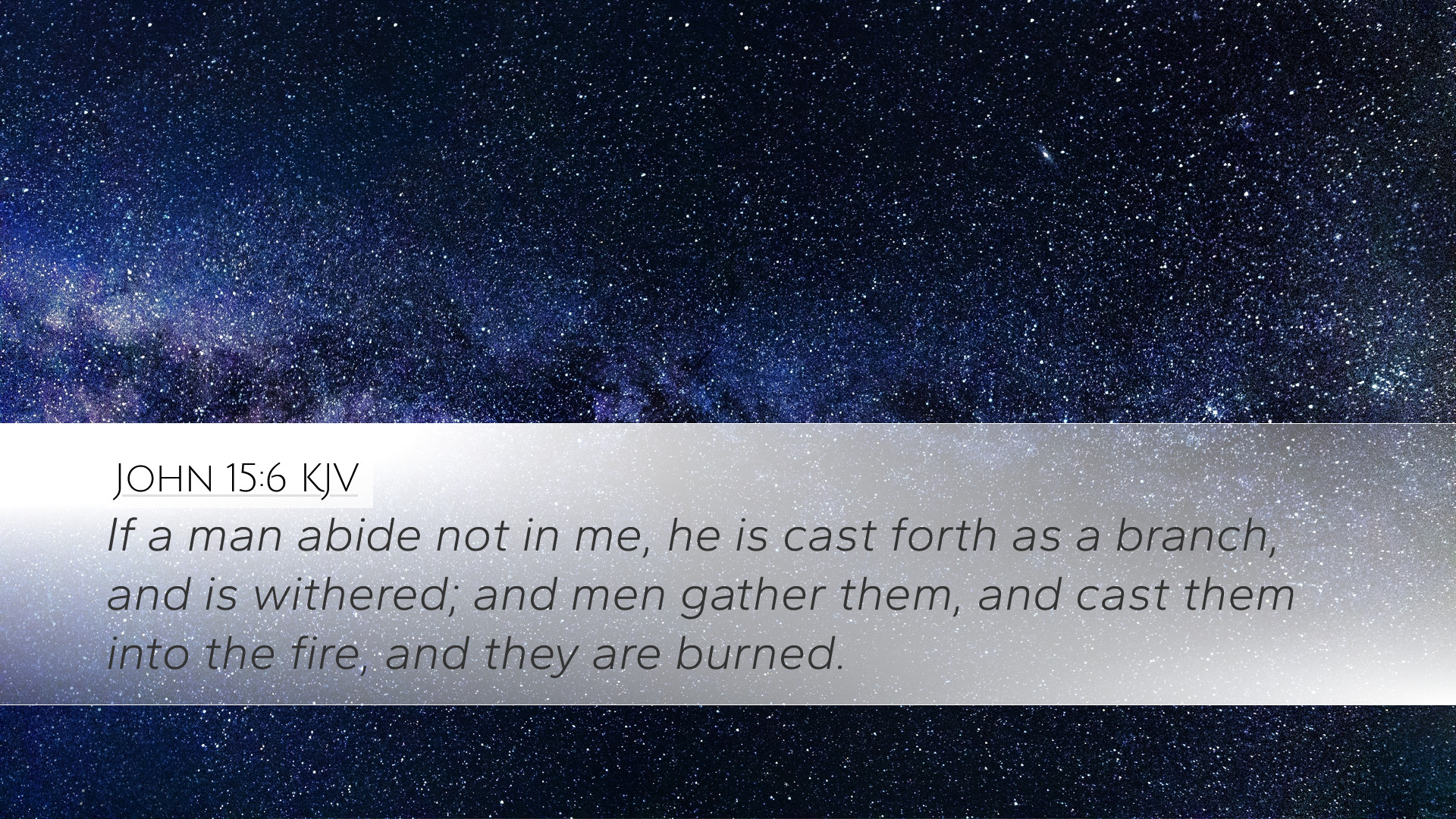Old Testament
Genesis Exodus Leviticus Numbers Deuteronomy Joshua Judges Ruth 1 Samuel 2 Samuel 1 Kings 2 Kings 1 Chronicles 2 Chronicles Ezra Nehemiah Esther Job Psalms Proverbs Ecclesiastes Song of Solomon Isaiah Jeremiah Lamentations Ezekiel Daniel Hosea Joel Amos Obadiah Jonah Micah Nahum Habakkuk Zephaniah Haggai Zechariah MalachiJohn 15:6
John 15:6 KJV
If a man abide not in me, he is cast forth as a branch, and is withered; and men gather them, and cast them into the fire, and they are burned.
John 15:6 Bible Commentary
Commentary on John 15:6
In John 15:6, we find a profound statement from the lips of Jesus concerning the nature of discipleship and the consequences of failing to abide in Him. This verse states:
“If anyone does not abide in Me, he is cast out as a branch and is withered; and they gather them and throw them into the fire, and they are burned.”
This passage presents a rich theological tapestry woven from the themes of relationship, consequence, and the final judgment, as we will explore through insights from noted biblical commentators.
Contextual Analysis
John 15 is situated within the Farewell Discourse, where Jesus prepares His disciples for His impending departure. He uses the metaphor of the vine and branches to illustrate the essential connection between Himself and His followers. The imagery communicates vitality and dependence.
Spiritual Abiding
Matthew Henry emphasizes the necessity of abiding in Christ, stating that true believers are those who remain in Him. The act of abiding is more than mere association; it signifies a profound connection that affects one's spiritual vitality. Without this connection, one's faith becomes ineffective.
Albert Barnes points out that this verse encapsulates the dire consequences of failing to remain in Christ. He notes that the term "cast out" indicates a definitive separation from the source of spiritual life. Branches that do not bear fruit demonstrate their non-connection to the vine, and thus their fate is to wither and be burned.
Theological Implications
The implications of John 15:6 are both sobering and illuminating. Adam Clarke elucidates this verse by pointing to the judgment awaiting those who fail to abide. His commentary offers a historical understanding, suggesting that these words serve as a warning to the Jewish leaders, who were then failing in their covenant relationship with God.
The Nature of Discipleship
The call to abide reflects the nature of discipleship. It's an ongoing relationship that requires personal commitment. As Matthew Henry notes, this is not merely about outward religion but involves an inward transformation that bears fruit in the life of the disciple.
Consequences of Non-Abiding
In his analysis, Albert Barnes illustrates the stark reality of spiritual barrenness. He comments that the withering signifies a state of decay—both spiritually and relationally. The gathering of these branches for burning emphasizes the finality of judgment for those who do not maintain their connection to Christ.
Encouragement for Believers
However, amidst the warning, there is encouragement for the genuine believer. Adam Clarke encourages readers to reflect on their connection with Christ, stating that true branches, despite challenges, will naturally produce fruit as a result of their abiding relationship.
The Call to Fruitfulness
The call to fruitfulness is central to understanding our role as Christians. Matthew Henry notes that this fruit is not only exemplified through actions but rests predominantly in Christ-like character, love, and good works as the natural outgrowth of a life in Christ.
- Personal Transformation: The believer's life is characterized by a change that reflects Christ's nature.
- Community Impact: The fruits of love and service benefit the broader community, reflecting the kingdom of God on earth.
Symbolism of Fire
The imagery of fire has dual implications: destruction and purification. Albert Barnes articulates that the fire referred to may symbolize the ultimate separation from God or indicate the purging process that truly unites believers to Christ. It becomes essential to comprehend the active role of divine judgment contrasted against the grace extended in fellowship.
Role of Judgment
Judgment is a theme that resonates through the scriptures, and John 15:6 serves as a reminder of the seriousness of one's relationship with Christ. Adam Clarke posits that Jesus’ audience would have understood this judgment within the context of their covenant identity with God, modernizing the application for contemporary readers to reflect on their own spiritual accountability.
The Urgency of Abiding
This verse leaves readers with a sense of urgency regarding their spiritual state. As Matthew Henry points out, abiding is not a passive state but requires diligent effort and intentionality. There is no room for complacency in spiritual matters—one must actively cultivate their relationship with Christ.
Final Thoughts
John 15:6 stands as a theological beacon calling believers to reflect deeply on the significance of abiding in Christ. Both warnings and assurances resound in this passage. Ultimately, it provokes serious contemplation about the fruits—or lack thereof—of one's life as a testament of faith.
In conclusion, may this passage serve as a catalyst for a deeper exploration of our relationship with Christ, urging pastors, students, theologians, and scholars alike to examine what it means to truly abide and the ensuing implications of spiritual connection.


